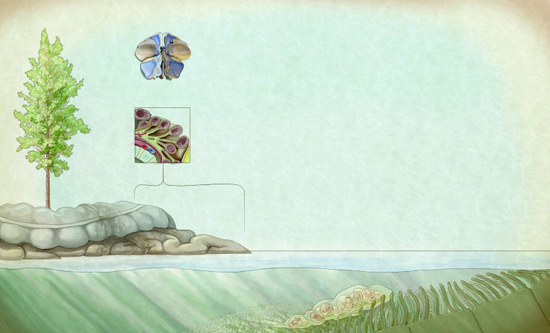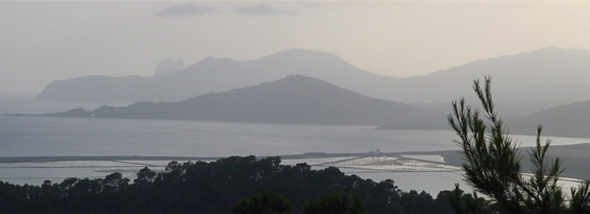
"Your inner ecology, like this fantasy bio-landscape, is a dynamic community in a delicate balance."
Photo and see more: # 1 below
A Reflection on Inner Ecology
“Exploring Health & Wellness from an Ecological Perspective”*
Your Piece Of The Planet
Have you ever thought about your body as a little piece of planet Earth? If you think about it for a minute, about what your body is made of and what keeps it alive, it’s kind of amazing.
Your entire body is made of Earth stuff- every single molecule and atom. And where do those atoms come from? From the Earth’s biosphere, from the other life forms doing their life processes, from the trees and plants converting Earth elements into forms we can live on. Food, water and air keep your body alive; the air you breathe, the food you eat and the water you drink become your flesh and blood.
Your body is your personal piece of planet Earth. It’s an ecological microcosm of the planet that’s all yours to live in and care for. How we treat our bodies is not different from how we treat the planet. Are we cooperating with the natural environment, supporting its health and wellbeing, or are we creating imbalance, stress and disease? Are we building a toxic waste dump or a vibrant, healthy ecosystem?

Photo: ecology.com
Inner Ecology makes the connections between the inner ecology of the individual human body and the larger planetary ecology, weaving personal health and ecology together.
The word “ecology” comes from the Greek word “oikos”, meaning home or habitation and logie, meaning study of. Ecology is the study of the relationships and interactions between organisms and their environment.
Inner Ecology is the study of the relationships between the organisms and environment within our home habitat, within our bodies.
Every definition of the word ecology defines it in terms of relationships, and this is the key to a whole new way of understanding health and wellness.
A Healthy Personal Habitat
Through Inner Ecology, we will explore what creates and sustains a healthy, balanced personal habitat. In the process, we will question many old school presumptions. What do we really mean by being in good health? Is health merely the absence of obvious symptoms and disease or is it better described as a state of positive wellness, vitality and functional ability?
Understanding the body as a living, breathing ecosystem in a constantly fluctuating, self-regulating state of balance can give us new insights into how to create and sustain health and treat disease.
We’ll be making connections between the way life functions in the natural world and the way our body functions. For example, in the natural world, change the pH balance in a wetlands ecosystem and the whole system will change. Certain organisms will overpopulate, others will die off and the effects ripple throughout the entire system and up the wetlands’ food chain.

"To make outer ecology function we must be willing to activate our inner ecology, that part of us that knows and supports us to open up to our true feelings again."
The same is true in our bodies. Change the pH in your gastrointestinal tract by eating too much sugar, over-using antibiotics or undergoing heavy stress and the balance of microorganisms are bound to change. Typically, some types, like yeasts and fungi, can overpopulate and crowd out the “good” bacteria (like acidophilus and bifidus). The effects of that simple change can spread throughout your body’s entire ecosystem, like a chain reaction, affecting health in a variety of ways. For example, a yeast or candida overgrowth can compromise immunity, cause exhaustion and fatigue, impair cognitive function (brain fog), alter mood balance and disrupt a woman’s menstrual cycle.
Did you know that there are ten times the numbers of microorganisms living in your gut than cells in the human body, somewhere around 100 trillion? These organisms live in symbiotic relationship with us and perform a number of important metabolic functions, including: breaking down carbohydrates, enabling us to assimilate vitamins and minerals, and supporting healthy immune activity.
This idea of mutually beneficial symbiotic relationships is important in understanding both the planetary ecosystem and our personal ecosystems. What’s true in the macrocosm of the planet holds true in the microcosm of the body. Healthy vital habitats, whether small or large, arise from a vast web of interconnected, interdependent life forms in symbiotic relationship with one another.
Conventional medical science has been saddled with the heritage of the 19th century mechanistic, reductionist approach to the human body; viewing it as a machine, reducing it to smaller and smaller separate parts and bio-chemical processes. But increasingly, all biological sciences are switching to an integrative, systems perspective that studies complex layers of inter-relationships.
The growing understanding is that there is really no separate discrete immune system or nervous system or endocrine system. For example, classically the brain is considered the center of the nervous system, but it’s also a major organ of the immune and endocrine systems. The gastrointestinal tract contains 60 – 70 percent of all the immune cells in your body, so we would have to include it as part of the immune system, too. And, since it performs some critical hormone metabolism functions, wouldn’t that make the gastrointestinal tract part of the endocrine system?
You And The Environment Are Not Separate
Our cells are in constant communication, constant interaction with the world around us. They are continuously sending and receiving signals, responding to a never ending flow of messages and information from our inner and outer environment.
And, our mind and emotions are not separate from this communication network. Every thought we think, every emotion we feel, has an electro-chemical expression that floods through the blood stream and signals the cells. These messages can change how cells, tissue groups and organs function, and eventually may even change their shape and form.
Take a moment and think about this: With every breath, each inhale and exhale, you breathe the biosphere into your body and breathe yourself back out into the biosphere.
The truth is, we share the same biosphere and the same bio-chemical basis of life with all living creatures, from single-celled organisms to killer whales. All life on this planet is carbon-based and cellular in nature, and everything is inter-connected and inter-dependent.
We each have a natural right to be here, to be alive, to take our place in the larger environment and community of planetary life. We can collaborate and cooperate; we don’t need to dominate.
The prevalent belief systems that view human beings as superior to and separate from our environment, that imply that we are here to dominate the Earth and everything on it, are proving to have disastrous consequences, not only for the planet, but for each of us personally. We pay a very high price for feeling disconnected from our habitat, our physical home.
The Power Of Connection
Here at Inner Ecology, we want our audience to feel more personally connected to the planet, to feel the relationship between their physical body and the Earth from which it’s made. Awareness is the key to feeling connected. The simple act of paying more attention to your physical sense experience increases the feeling of connection and aliveness. This works on both the macrocosmic and microcosmic levels.
At the microcosmic level are all the internal sensations of your body. If you become more attentive and responsive to your body’s sensory messages about its needs (for fresh whole food, water, rest, exercise, etc.) you can strengthen the built-in feedback loop for wellbeing and vitality.
At the macrocosmic level, getting outside and bringing awareness to the sensory experience of the ground beneath your feet, the sun on your skin, the smell of the trees, the caress of a summer breeze all amplify your feeling of connection.
The more connected with one’s personal inner ecology, the more effective one can be at influencing the global ecology. As a single individual, the desire to have a positive impact on global environmental issues can feel daunting and overwhelming, but you can have a direct impact on the personal environment of your body, to act on your own and see the results. Besides the personal benefits of looking and feeling better, your actions influence others and affect the world around you in a myriad of ways. Small changes can make a big impact.
Take your daily food choices as an example. What are you teaching and modeling your children and family and when you select fresh, whole, local organically grown foods? How might that impact your children’s lifelong food habits and long-term health? What is the difference in your environmental impact between a diet emphasizing locally grown foods versus one based on foods transported from thousands of miles away or that have been highly processed and pre-packaged? What is the impact on local air, soil and water quality of switching to food grown locally without chemical pesticides, fungicides and fertilizers?
It all starts with everyday actions. We can all do something, right here, right now. If we start with our relationship to our inner ecology, each of us has the ability to act on our own, to make changes and to see positive results. This generates a greater sense of personal empowerment and effectiveness, while also benefiting the lives of those around us, and the planet as well.
Most of all, connecting and cooperating with natural ecosystems, whether internal or external, FEELS SO GOOD!
*This article byMikhaila Stettler was first published on 19 September 2011 at ecology.com
See the original article: What Is Inner Ecology? | Ecology Global Network
Mikhaila Stettler is a clinician and health educator with over 25 years experience in the health, wellness and personal growth field. She maintains a clinical practice integrating traditional Chinese medicine, clinical nutrition, functional medicine, and homeopathy, in addition to her work in new media lifestyle edutainment. With a master’s degree in traditional oriental medicine from the PacificCollege of Oriental Medicine, Mikhaila is state and nationally board certified in acupuncture and Chinese herbal medicine. Additionally, Mikhaila has extensive experience teaching exercise therapy, yoga, qi gong and meditation.
Photo credits:
#1: The Ecology Within | Pitt Med | University of Pittsburgh
#2: Ibiza Transition Island - INNER ECOLOGY
